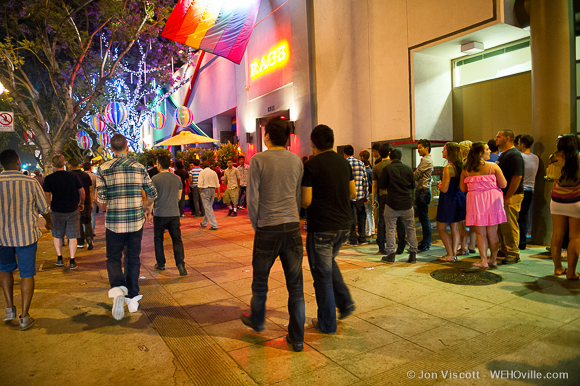
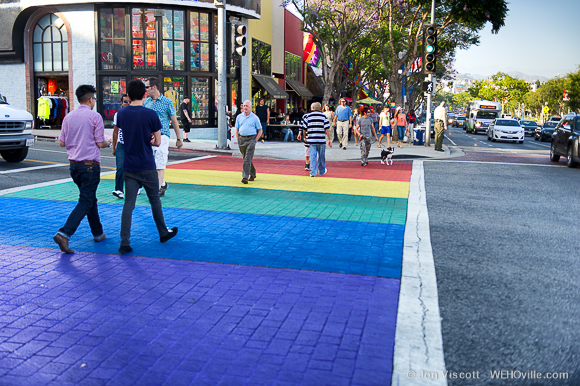
[dropcap]R[/dropcap]ainbow flags fly overhead. L.A. Pride banners hang from streetlight posts. As the afternoon sun gives way, the sidewalks begin to bustle with activity.
By 9 p.m. on Friday night, it’s a whole new world on Santa Monica Boulevard. Trees blink with monochromatic holiday lights. In the window of the Andrew Christian underwear store, the TV screen shows steamy gay storylines unfolding in a continuous loop.
Gaggles of 20-something men traverse the rainbow crosswalks that famously mark the San Vicente intersection. At one corner, two guys have stationed themselves to hand out postcards promoting a fundraiser for The Trevor Project, an LGBT suicide hotline based in West Hollywood.
Outside the bars, the patios are getting crowded. There are women scattered in the crowds, but they’re definitely in the minority.
This is Boystown. At least, that’s how some people think of the corridor between La Cienega and La Peer. Others object and say they find the name exclusive and divisive.
A Safe Haven
“Everybody calls it Boystown because of all the boys,” said Larry Block, owner of the Block Party gay men’s clothing store. Block is a passionate supporter of the City Council making the Boystown moniker official. The Council considered doing so in 2011, but the idea didn’t come to fruition.
If the Council had recognized the area, it would have become the country’s second official Boystown, the first being a district in Chicago’s Lakeview neighborhood. Like West Hollywood, the Chicago neighborhood (once known as New Town and now sometimes written as “Boys Town”) is a night life hotspot and an LGBT enclave where Pride events have been held since the early ’70s.
Block sees using the term Boystown as a way to recognize West Hollywood’s as a safe haven. He thinks of the many gay men who found in West Hollywood a place where they could freely hold hands and be themselves. He sees it as paying homage to the history of an area where over the years hundreds of LGBT people have gathered to protest an HIV quarantine initiative, to march in response to Prop 8 and to mourn the deaths of lives lost to hate violence.
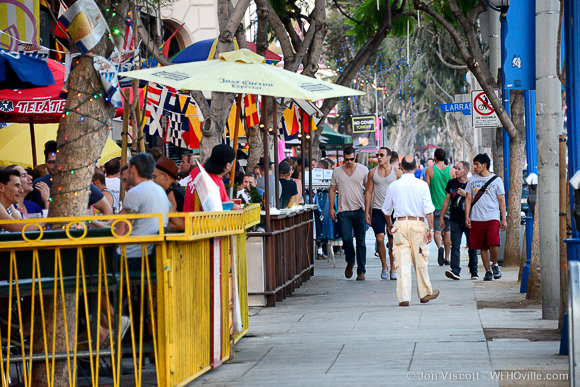
A Double-Edged Sword
The area’s history, and the name Boystown, represent a double-edged sword to some people, said Jim Anzide, owner of Out & About Tours. The company offers an LGBT history bus tour that starts near the West Hollywood Library and goes through WeHo before veering east into Silver Lake and Downtown Los Angeles.
The area that in 1984 became West Hollywood was once a blue-collar railroad town known as Sherman. Because Sherman fell outside the jurisdiction of the Los Angeles Police Department, which was known for harassing LGBT people, it appealed to gay soldiers stationed in the area. Many didn’t want to leave after the war ended, Anzide said. They had found a place that felt welcoming—but the invitation didn’t always extend to everyone.
“It was basically a white boys town,” Anzide said. Women and people of color were frequently excluded from the clubs, which Anzide said contributes to some people having a negative perception of the term Boystown.
Based on “oral history” he’s collected from talking to people over the years, Anzide points to the 1938 film “Boys Town” as the most likely origin of the name. Spencer Tracy and Mickey Rooney starred in the movie, which tells the story of Father Edward Flanagan, a priest who operated a home for boys.
Although he understands Boystown being used as “a colloquial phrase,” Anzide thinks that making it an official designation would be a disservice to lesbians as well as to WeHo’s older men, some of whom were once the young “boys” who laid the foundation for the area.
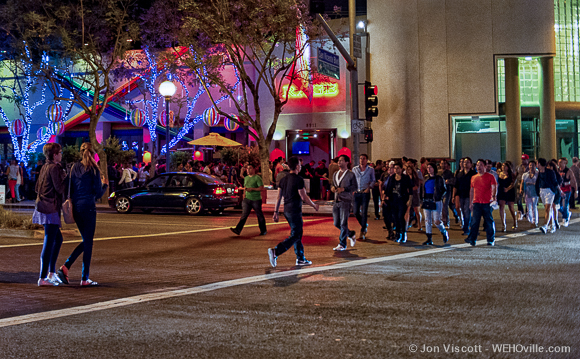
Our Town: An LGBT Enclave
Of course, the LGBT movement has made tremendous strides since West Hollywood’s inception. The LGBT community weathered the hardest years of the AIDS crisis. Sodomy laws were declared unconstitutional. Many states — including, briefly, California — legalized marriage rights for same-sex couples.
Along with this cultural shift, is the need for LGBT enclaves fading?
Ivan Estrada of the Collen & Ivan Real Estate Group at Keller Williams says that some of the “stigma” of living in WeHo — the idea that the city’s residents have to be gay — is lessening. He likes the idea of the area becoming less segregated while maintaining its strong involvement in LGBT issues.
James Guay, a therapist whose practice is located on the Sunset Strip, said that many clients have told him they didn’t feel safe in other places, especially if they grew up in “rigid, homophobic environments.”
“Historically, there’s been a real need for a gay neighborhood,” Guay said.
However, he does see a shift taking place as areas outside of “gay villages” become welcoming places for LGBT people to live.
As for the Boystown moniker, Guays says that it “feels exclusionary.” He’d like to see West Hollywood do more to welcome people of all ages, sexual orientations, gender identities and ethnicities. He’d prefer to dub the area “Our Town,” with “our” including everyone.
“I get that there are more gay men out there in that particular area, but it also doesn’t speak to other communities,” he said.
Elisabeth Sandberg, an English professor who lives in West Hollywood, isn’t comfortable with the idea of her neighborhood being called Boystown. Sandberg said the name seems to exclude lesbians, which she sees as inappropriate, particularly in light of the way many lesbians rallied in support of gay men during the height of the AIDS crisis. She also finds it demeaning to refer to adult gay men as “boys.”
Sandberg moved to West Hollywood about nine years ago because of its identity as an LGBT haven. It was important for her to live where she would be accepted and find like-minded people.
“I needed to get involved,” she said. “It was tremendously important in terms of my own development as a lesbian.
“It makes me happy when I come home from work and I see the rainbow flag and the rainbow crosswalks.”
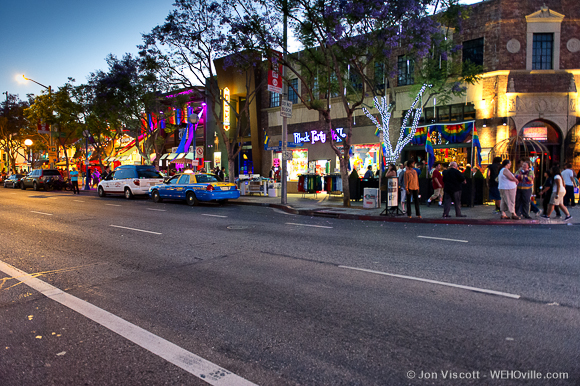
Chris Bowen, too, moved to West Hollywood largely because of its LGBT community.
“I really like that I live in an area that is very open and accepting,” Bowen said.
The 25-year-old political consultant and his boyfriend live near the bars and go out in the area frequently. In fact, friends from all over Southern California visit them to partake in the gay night life. But they don’t usually refer to the area as Boystown. To Bowen, the strip is a familiar part of his neighborhood and it doesn’t need a special name. He simply refers to it as “the boulevard.”
It isn’t only the boulevard where LGBT people — not just those who live in WeHo — turn to connect with their community.
Ru Stevens-Ortiz for example, comes to the area for events organized by the Pop Luck Club, a group for gay dads and prospective dads. Stevens-Ortiz and his partner, who have 5- year-old triplets, live in the Mt. Washington area but have considered sending the kids to school in West Hollywood, where they’d see more families like theirs.
To Stevens-Ortiz, the WeHo area is a place to connect with resources for his family.
“I wouldn’t necessarily be proud of saying our kids are in school in Boystown,” he said.
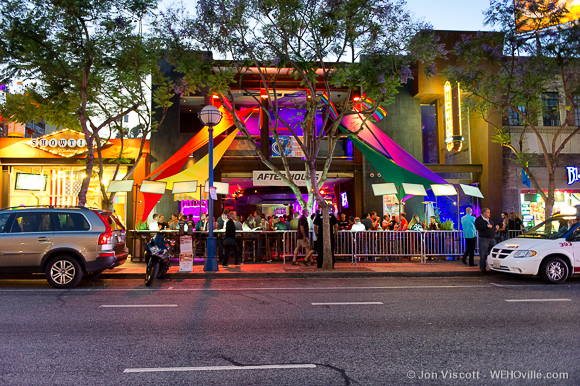
Taking Care of Business
Larry Block sees recognizing Boystown as not only a way to acknowledge the area’s history and culture but also as a way to roll out the rainbow carpet to tourists. He envisions promoting the area as a tourist destination with an “active retail community.”
Genevieve Morrill, president of the West Hollywood Chamber of Commerce, said the fact that the city was founded as a safe haven is significant. She sees value in the Boystown moniker, though she thinks it is important that it be called “Historic Boystown.”
“I think it has absolute benefits,” Morrill said. “We have to be cognizant of what it indicates, what the perception is.”
Morrill belives there is a way to address those perceptions while leveraging the value of the Boystown name. To Morrill, that means thinking about how the entire area is branded. She thinks that a segment of a proposed business improvement district — but not the whole district—should be known as “Historic Boystown.”
Boystown moniker aside, the thriving night life is just one aspect of life in the Creative City.
West Hollywood is also a city where LGBT parents take their kids to the park. It’s a city where photos of lesbian-parented families from the South are on exhibit in the library. It’s a city where LGBT people gather for protest marches, candlelight vigils, book clubs and dodgeball games.
But each Friday and Saturday night as the sunlight fades, the music comes up, the drinks begin to flow and the nightlife pulses with energy.

Boystown is an offensive name to me. Also all the Lesbian bars have disappeared in Chicago. It makes the area male-oriented and exclusive. It’s a silly name with big rainbow phallic symbols all along the area’s main street. I find that extremely offensive and sexist.
New Town and Boystown are not the same in Chicago. New Town was centered around the Century shopping center at the intersection of Clark, Broadway and Diversey. All of the bars that were on Clark and Broadway in New Town in the 1970s (Cheaks, Take One, Paradise, Bulldog Road among others) have been closed for over 20 years. The name New Town itself is not used any more, replaced with the actual name Lincoln Park or sometimes Diversey Harbor. Boystown is on Halsted between Belmont and Grace, 3/4 mile north of where New Town was. I think the first gay… Read more »
Hey ya all.. how bout this. The intersection of San Vicente and Santa Monica, — a cultural landmark. “Historic Boystown Square” Designating Boystown is not intended to ‘change the name of the city’ or any part. Its to simply honor the area for its historic signifigance and in this case, Boystown is the slang word most people use to designate the area of town where the guys gather for so many years. Why do we always have to be so appropriate, cant we honor the guys who actually were the majority .. its not shuting anybody else out. We have… Read more »
i’m pretty sure that’s whats being proposed, but west knoll to la peer is probably more like it
I have been a permanent resident of West Hollywood since 1986, coming from Chicago where the moniker “Boystown” refers to a particular identifiable (and rather small) area of the city. Like Chicago, West Hollywood is far more than a strip of gay clubs and retailers appealing to young men. It is a the home of some of the hottest restaurants in LA, home of the Sunset Strip and its music legacy, a fashion-lovers destination with flagship stores of some of the worlds most renowned designers and a city with a reputation for excellent social services for our senior and Russian… Read more »
still seems funny that we’re trying to “officially” name it after all of these decades and when it’s reign is almost over (i give it about 10 more years til most of boystown as we know it is gone to development)…..and why darrell thinks his OPINION is more important than anyone else’s, i’m not sure….it’s a dumb idea, but so be it…..rainbow crosswalks are a dumb idea too, but we have them….either it’ll happen, or it won’t…..it’s not like the council listens to their employer (residents) anyway….
Well said, Larry!
Dear People… its knows as Boystown.. i did not invent the name. In the history books in the archives of the West Hollywood library you can read that ‘Boystown” is the name given to the area where the gays gathered in the late 60’s and 70’s to get away from the beareucrats of Los Angeles living in small trolley homes across from the Sherman Railyards.. its in the History of West Hollywood book in the archives. Im not sure why boystown is offensive.. progressive people in chicago didnt have a problem with the name boystown…. boystown refers to a piece… Read more »
Larry, Then call it “Gaytown”, “Historic Boystown” is preposterous and pretentious. “Please excuse me I’m late for a meeting in Historic Femmetown,” (or Historic Butchtown , or Historic Transexualtown). Why not Historic Mantown?
They all sound absurd, don’t they?
You have taken a sweet, ironic and self-identifying phrase that started in the repressive atmosphere of the 60’s, and you are trying to overload it to meaninglessness by making it “official”.
The name Boystown is not offensive per se. A city council forcing it down everybody’s throat is.
No, I don’t believe anyone really cares at all about this, but there are always those few who need a cause to advance so they will have a reason to get out of bed in the morning, and to give their lives meaning. I just wish the rest of us would stop giving them a platform, and changing everything to pacify them until they move on to some other silly issue.
Again, they are the CHRONICALLY aggrieved.
Is this really something people care about?
Yes – I find Historic hard to swallow. Wrecking Ball is a more apt moniker for WeHo-Ho-Ho.
Here we are again with the chronically offended. And here we go again bending over backwards to accommodate them. These are people with way too much time on their hands who will forever be in search of a new grievance.
It’s BOYSTOWN! Get over it!